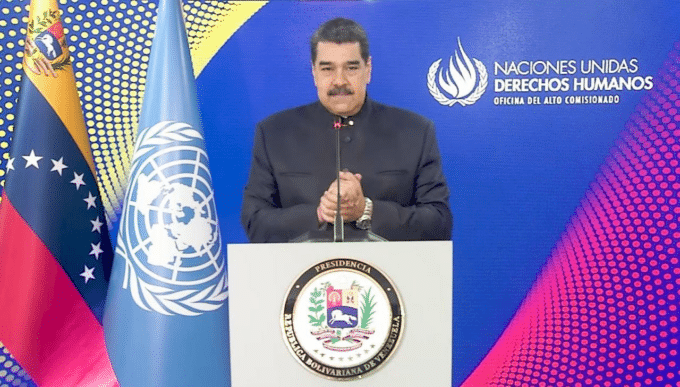
Venezuelan president Nicolas Maduro in his speech at the 49th Regular Session of the UN Human Rights Council. Photo: Alba Ciudad.

Orinoco Tribune – News and opinion pieces about Venezuela and beyond
From Venezuela and made by Venezuelan Chavistas

Venezuelan president Nicolas Maduro in his speech at the 49th Regular Session of the UN Human Rights Council. Photo: Alba Ciudad.
The President of Venezuela, Nicolás Maduro, spoke this Monday, February 28 at the 49th Regular Session of the UN Human Rights Council, and denounced any intention to use the international human rights system “to replace governments not aligned with Western hegemonic interests, imposing against the countries of the South formulas of judicial colonialism seeking to replace national systems with interventionist, colonialist, foreign mechanisms, contrary to the principles of sovereignty, self-determination and complementarity.”
In his speech, he also repudiated the actions of the Bank of England which, with the support of the United Kingdom, is holding 31 tons of gold from Venezuela’s reserves. The Novo Banco de Portugal has sequestered, by freezing, more than one billion dollars of Venezuelan assets. Citibank illegally transferred $342 million dollars of Venezuelan assets from the Central Bank of Venezuela to a US Treasury account.
President Maduro showed that an international criminal organization is funded with these assets, based on the pretext of the recognition of a non-existent government. This organization plans and executes destabilization operations against Venezuela. These three aforementioned financial institutions, he added, “deny us the right to use funds to buy vaccines, medicines, food or supplies in the fight against COVID-19, and to guarantee the rights to health and life for the Venezuelan people.”
Venezuela’s president also reproached the International Monetary Fund that, due to pressure from the US government, has refused to allow Venezuela to access five billion dollars in special drawing rights. These funds, noted President Maduro, belong to Venezuela “by right, to fight the pandemic and for [securing] the rights of our people.”
The president stressed that the illegal economic coercive measures—euphemistically referred to as sanctions—”have deprived our country of 99% of its foreign exchange earnings from exports” and of at least 30 billion liquid dollars “which are part of Venezuela’s assets abroad.”
Kidnapping of Alex Saab
President Maduro also condemned the illegal kidnapping of Ambassador Alex Saab in Cape Verde in June 2020, “when he was on an official mission to bring food and medicine to Venezuela.” On October 16, 2021, Saab “was kidnapped by a group of United States soldiers and taken illegally from Cape Verde to Florida,” despite “the clear and unequivocal (binding) sentence of the Court of the Community of African States Occidental (ECOWAS) ordering his immediate release. Saab’s diplomatic immunity, his human rights and his physical integrity were cruelly and systematically violated, noted President Maduro, and the process in US courts has been riddled with errors and distortions.
RELATED CONTENT: Cuba Takes Position on Ukraine Conflict: “Russia Has the Right to Defend Itself”
The Venezuelan president pointed out that in late 2021, Saab was also appointed as official and permanent representative for the dialogue in Mexico between the Venezuelan government and the opposition. Therefore, his second kidnapping and illegal extraction to the US was “a deliberate and cunning blow to the development and continuity” of the dialogue process in Mexico.
Social protection and human rights
The president explained that 77% of the country’s budget goes to social programs and social security. As a result, between 2016 and 2021, about 2.8 million homes were built by the Venezuelan government, bringing the total to 3.9 million built since 2011, benefiting more than 10 million Venezuelans. The CLAP food program has provided sustenance to more than seven million families. 84% of the institutions that provide education are state-owned, and 93% of them have special free food programs for students. The Patria system was created, which today comprises 21 million people who receive state social care. 29 elections have been held since the beginning of the Bolivarian Revolution in 1999.
In addition, President Maduro recalled the events of February 27, 1989, which left thousands throughout the country dead following brutal repression of protests by the neoliberal government of the time. Demonstrations and unrest broke out after the imposition of economic “reform” measures demanded by the International Monetary Fund. As President Maduro noted, there was no support for Venezuelans from the international community at that time. From that tragedy “a historic force was born for the transformations that have taken place in Venezuela,” which have brought, among other benefits, a political and social revolution, a new Constitution, and a national system for the protection of human rights.
The diplomat also recalled that Venezuela has participated for the third time in the universal periodic review of the Human Rights Council, “with a constructive and cooperative spirit,” recording its achievements, progress, and pending challenges. Since 2019, Venezuela has been working with the Office of the High Commissioner, Michelle Bachelet, “to continue strengthening the human rights model in our country.” Officials of the High Commissioner are fulfilling their mandate in Venezuela with total freedom, while the office provides technical support to more than 10 government institutions across various sectors. An invitation has also been extended to the Special Rapporteur on the Right to Development, in cooperation with the Human Rights Council.
Featured image: Venezuelan president Nicolás Maduro in his speech at the 49th Regular Session of the UN Human Rights Council. Photo: Alba Ciudad.
Translation: Orinoco Tribune
OT/JRE/SL